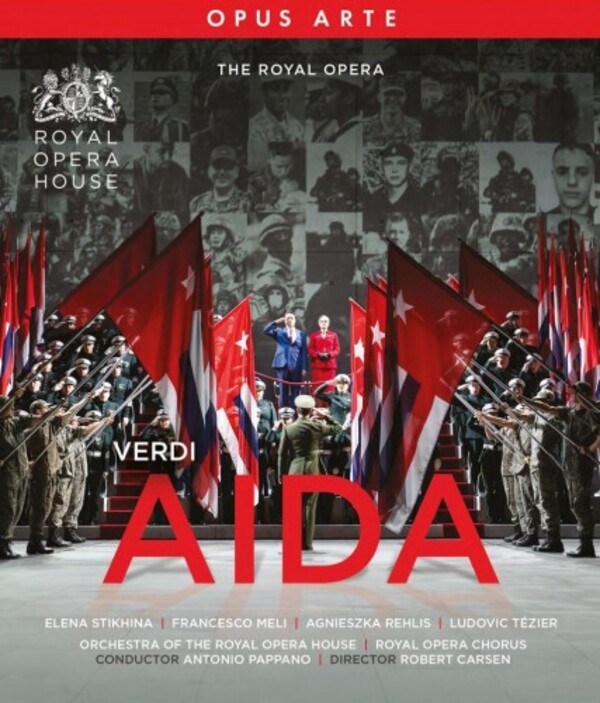VERDI Aida (Pappano)
View record and artist detailsRecord and Artist Details
Genre:
Opera
Label: Opus Arte
Magazine Review Date: 10/2024
Media Format: CD or Download
Media Runtime: 157
Mastering:
DDD
Catalogue Number: OA1383D

Tracks:
| Composition | Artist Credit |
|---|---|
| Aida |
Giuseppe Verdi, Composer
Agnieszka Rehlis, Amneris, Soprano Andres Presno, Messenger, Tenor Antonio Pappano, Conductor Elena Stikhina, Aida, Soprano Francesca Chiejna, High Priestess, Soprano Francesco Meli, Radames, Tenor In Sung Sim, King of Egypt, Bass Ludovic Tézier, Amonasro, Baritone Royal Opera House Chorus, Covent Garden Royal Opera House Orchestra, Covent Garden Soloman Howard, Ramfis, Bass |
Author: Tim Ashley
Robert Carsen’s Covent Garden staging of Aida, filmed during its opening run in October 2022, essentially dispenses with Egypt and relocates Verdi’s opera to an unspecified military superpower in the present day. Some reviewers on opening night took North Korea to be the principal frame of reference, though Carsen, in an interview included in the DVD extras, tells us he was primarily thinking of China, Russia or the US, and the emphasis falls squarely on the horrors of modern warfare. The invasion of Ukraine, which took place long after the production was planned but before it opened, gives it chilling resonance.
Miriam Buether’s sets largely consist of a series of grey shuttered bunkers and claustrophobic enclosed spaces. A severe-looking chapel serves as the temple of Ptah. The Nile scene takes place in a mausoleum where a flame burns to an unknown soldier. Coffins draped in flags are borne offstage at the start of the Triumph scene, which ends with searing black-and-white video projections of massed tramping feet and aerial bombardments.
Though some of it is unsettling, there are also serious flaws. Verdi is thinking not only of armed conflict but of theocracy, yet Carsen awkwardly reimagines Ramfis and his priests as a uniformed military elite, and we lose sight of the work’s emphasis on the stranglehold exerted by religion upon temporal politics. Carsen’s stagecraft also falters in the second half. Amonasro arrives in Act 3 with a group of guerrilla fighters in balaclavas, who violently accost Aida when she expresses horror at the thought of betraying Radames, which dilutes, rather than adds to, the scene’s impact. Radames’s trial, at what is now a military court, is brought onstage with Agnieszka Rehlis’s Amneris wandering abstractedly between rows of impassive officers, which pulls the musical balance adrift and cramps her style, vocally and dramatically. She’s a fine singing actress and, until then, gets the mix of slinky sexuality and contemptuous hauteur bang on.
As Radames, Francesco Meli bravely tackles all the role’s challenges, and ‘Celeste Aida’ really does end pp morendo as per the score. His tone under any sort of pressure, however, is regrettably too uningratiating for pleasure or comfort. Elena Stikhina’s Aida and Ludovic Tézier’s Amonasro prove more consistent. She struggles with the treacherous ascent to top C in ‘O patria mia’, but the mixture of silver and silk in the sound is wonderfully appealing and her subtle depiction of Aida’s anguish really hits home. Tézier, in tremendous voice, gives us a finely judged portrait of a political leader whose manipulative ruthlessness is born of bitter years of desperation. Soloman Howard makes an imposing Ramfis, tellingly more authoritative than Insung Sim’s rather anonymous presidential King.
The choral singing is terrific, nowhere more so than in the hushed invocations to Ptah in Act 1, and Antonio Pappano’s conducting is admirably taut in its propulsion and intensity. The dynamic range is slightly wider than in his studio recording for Warner (A/16): the big ceremonials are almost oppressive in their grandeur, though there’s plenty of sharply observed psychological detail as well as tension in the great confrontations. The opening of the Nile scene sounds particularly exquisite, giving us the sense of air, heat and space that Carsen’s staging so conspicuously lacks here. It all adds up to a brave attempt to rethink a work which, for all its popularity, can be notoriously elusive in performance, though ultimately its theatrical and vocal drawbacks don’t make it entirely satisfactory.
Discover the world's largest classical music catalogue with Presto Music.

Gramophone Digital Club
- Digital Edition
- Digital Archive
- Reviews Database
- Full website access
From £8.75 / month
Subscribe
Gramophone Full Club
- Print Edition
- Digital Edition
- Digital Archive
- Reviews Database
- Full website access
From £11.00 / month
Subscribe
If you are a library, university or other organisation that would be interested in an institutional subscription to Gramophone please click here for further information.




